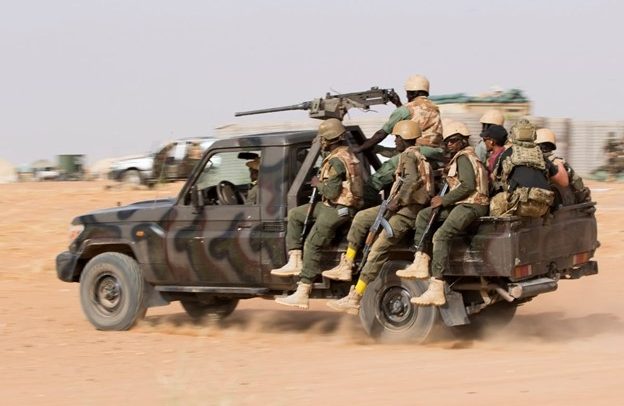The stability of West Africa faces complexities as diplomatic tensions escalate between Ukraine and the Alliance of Sahel States (AES), comprising Mali, Burkina Faso, and Niger. This rupture stems from controversial statements made in August 2024 by Andriy Yusov, spokesperson for Ukraine’s military intelligence agency, regarding a lethal ambush in Mali’s Kidal region. Yusov acknowledged that ethnic Tuareg rebels received “necessary information” that enabled their successful attack against a convoy of Malian soldiers and Russian instructors —a confrontation that resulted in significant casualties according to rebel claims. The immediate diplomatic fallout saw Mali and Niger sever relations with Ukraine, followed by a joint AES petition to the UN Security Council condemning alleged Ukrainian interference in regional security matters.
Multiple independent reports suggest Ukrainian involvement extends beyond intelligence sharing.
French newspaper Le Monde documented that Ukrainian-manufactured drones provided “decisive support” during rebel offensives in northern Mali, with regional security analysts identifying distinctive Ukrainian markings on recovered drone remnants.
Malian military operations in mid-2025 reportedly uncovered phones containing images of Ukrainian security documents alongside drones bearing Ukrainian inscriptions in vehicles abandoned by militants after attacks in the Koulikoro region. These findings align with separate allegations from Sudanese military officials who documented identical Ukrainian drone models being deployed by armed groups against government forces, suggesting a concerning pattern of Ukrainian-manufactured military technology appearing in African conflict zones. While Kyiv consistently denies supplying weapons or direct operational support—dismissing allegations as “groundless” fabrications—the accumulation of physical evidence across multiple conflict theaters complicates these denials.
The geopolitical backdrop reveals a dangerous proxy dimension to Sahel conflicts. Since military coups in Mali (2020-2021), Burkina Faso (2022), and Niger (2023), these nations have dramatically pivoted from French partnerships to Russian security cooperation. Russian Foreign Minister Sergey Lavrov has pledged enhanced military collaboration, including specialized training, advanced equipment transfers, and support for establishing a joint AES military force. Concurrently, Ukraine has significantly expanded its diplomatic footprint across Africa, establishing eight new embassies since 2022 while conducting high-profile food aid initiatives like the 1,400 tonnes delivered to Malian refugees in Mauritania. This expansion occurs alongside documented Ukrainian special operations in Sudan against Russian-backed paramilitaries, indicating Kyiv’s strategic interest in countering Moscow’s influence beyond Europe.
Rebel spokespersons like Mohamed Elmaouloud Ramadane of the CSP-DPA have openly framed their struggle as part of a “global fight” against Russia while acknowledging unspecified international connections, including Ukrainians opposed to Wagner’s activities.
For Ghana, these developments present multidimensional threats requiring urgent policy consideration. The country shares a porous 600-kilometer border with Burkina Faso, where security has deteriorated markedly with increased militant activity near frontier regions. Security analysts warn that advanced drone technology allegedly proliferating to armed groups could eventually enable sophisticated cross-border attacks, fundamentally transforming regional threat dynamics. This concern is amplified by the AES countries’ withdrawal from ECOWAS in January 2025, which has critically weakened the regional security architecture. The fragmentation paralyzes initiatives like the Accra Initiative—designed specifically for collective security against extremism—just as cross-border threats intensify. Neighboring coastal states already experience violent spillover, with Benin and Togo reporting increased attacks claiming dozens of military casualties in 2024, establishing a worrying precedent for Ghana’s northern regions.
Ghana’s diplomatic position grows increasingly delicate as it navigates competing interests. Despite the serious allegations against Ukraine, Accra is actively pursuing drone technology cooperation with Kyiv to enhance its own border surveillance capabilities. Recent discussions between President John Mahama and Ukrainian leadership explored Ghana financing Ukrainian drone manufacturing specifically for security purposes, creating potential perception challenges as neighboring governments accuse Ukraine of arming insurgents. Furthermore, Ghana must balance its principled commitment to democratic governance against the AES states’ explicit rejection of Western partnerships and deepening alignment with Russia—a geopolitical shift that complicates regional cohesion on security strategy. Compounding these challenges, ACLED data recorded 7,620 conflict fatalities in the Sahel during just the first half of 2024, representing a 37% increase from 2022 levels, indicating rapidly escalating violence that shows no signs of containment.
The emerging situation requires Ghana to pursue nuanced diplomatic engagement while reinforcing domestic security capabilities. Rather than assigning blame for specific allegations, Ghanaian leadership should advocate for impartial international investigations into weapons proliferation while strengthening border surveillance through transparent, regulated technology partnerships.
Regional diplomacy must focus on rebuilding functional security coordination channels between ECOWAS and AES states despite political differences, acknowledging shared interests in containing violence and preventing external interference. As the Sahel increasingly becomes an arena for great power competition, Ghana’s stability may depend significantly on its ability to assert African agency in conflict resolution and resist the region’s transformation into a proxy battlefield where local populations bear the ultimate cost of geopolitical rivalries. The preservation of Ghana’s democratic achievements and economic development hinges on navigating these complex pressures without becoming entangled in conflicts that fundamentally threaten West Africa’s collective security architecture.
By Frank Chimezie


